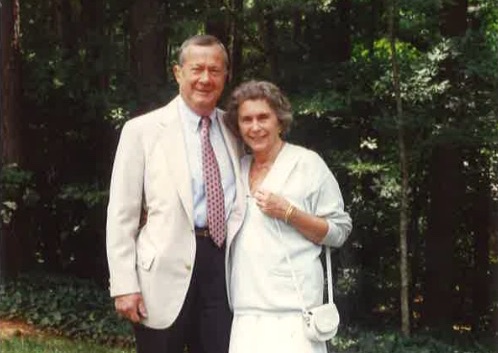
Jimmy sibley (1919-2015) - an atlanta leader who stood for fairness - saportareport
- Select a language for the TTS:
- UK English Female
- UK English Male
- US English Female
- US English Male
- Australian Female
- Australian Male
- Language selected: (auto detect) - EN
Play all audios:

By Maria Saporta Over the years, Jimmy Sibley and I would joke about the “when I’m dead” column. He would tell me certain things in confidence, and then tell me in his Southern gentlemanly
way that it could go in the “when I’m dead” column. Well this is a column I never wanted to write. Jimmy Sibley passed away on Sept. 17 at the age of 96 – telling friends in recent days he
was looking forward to being reunited with the love his life, his wife Karen, who died in 2014 at the age of 92. A service honoring Sibley will be held on Tuesday, Sept. 22 at 11 a.m. at All
Saints Episcopal Church. The family will greet guests at a reception following the service. I remember one of the first times I interviewed Sibley. I was writing a column about the Robert
W. Woodruff Foundation, on which he served as a trustee until his death. “I get to be a philanthropist with somebody else’s money,” he said with a twinkle in his eye. Sibley was a quiet, but
influential, force in Atlanta. When I first started writing a business column for the Atlanta Journal-Constitution, I asked executives who were the most powerful leaders in the city. People
soon started telling me about “the two Jimmys.” The late Larry Gellerstedt Jr. told me in 1991 that the most powerful man in Atlanta was Jimmy Williams, also a director of the Woodruff
Foundation and the Coca-Cola Co. board who later became CEO of SunTrust Banks. But when I asked Williams, he said the most influential person was Jimmy Sibley, then a senior partner with
King & Spalding who had just retired from Coca-Cola’s board. Of course Sibley said his influence was waning and that Jimmy Williams was more powerful. “He’ll ask the right questions
because his mind is so quick,” Sibley said of his longtime friend. That’s the way it was with Sibley. He never sought the limelight. He much preferred sitting in the background – observing
all that was taking plac.e in the city that he loved. In April 1992, Coca-Cola held its annual meeting in Atlanta instead of its customary spot in Wilmington, Del. As I entered the large
meeting room at the Georgia World Congress Center, I was surprised to see Sibley sitting on the next to last row. After all, Sibley had just retired as a director of the company – and he
would have been welcome on the front row. That was the year when Roberto Goizueta, Coca-Cola’s highly-respected CEO, had just received an award of 1 million restricted shares of Coke stock –
then worth $83 million – if he stayed with the company through April 1996. The magnitude of the stock award had made national news and had become extremely controversial. As a way to
diffuse a possible outcry from shareholders, Goizueta pre-emptively explained his stock award to shareholders saying he would do well only if they as owners of the company did well – that
their interests were aligned. As Goizueta was talking, Sibley leaned over and whispered in my ear: “I don’t believe a CEO should make more than three times what his secretary makes,” he
said. What a great quote – so appropriate then, and probably even more appropriate today – as I furiously wrote it down. “You can’t write that,” Sibley said. “Why not?” I challenged. “You’re
retired. What do you have to lose?” “My friends. My family. My business associates….,” Sibley said. “You can write that when I’m dead.” They just don’t make them like they used to. There
was a time when executives were aware of how much money they made relative to how much – or how little – money other people around them made. Sibley was one of those people. And that’s one
of many reasons why I hate to finally have to write Sibley’s “when I’m dead” tribute. _RELATED POSTS_
